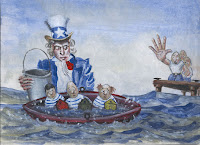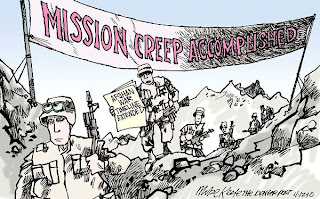Mission creep is when an original plan or objective is progressively widened by events on the ground. Significantly the phrase has military origin Originating in Somalia in 1993, the modern term “mission creep” became part of official U.S. Army vocabulary a decade late r. Field Manual 3-07, Stability Operations and Support Operations (February 2003) acknowledges two types of mission creep. The first occurs when “the unit receives shifting guidance or a change in mission for which the unit is not properly configured or resourced.” Lewis and Clark In other words you start with a limited objective but this expands to the point where it is no longer clear. This phrase has also been used to describe non-military matters - financial regulation, for example . The Dictionary of Military Terms




